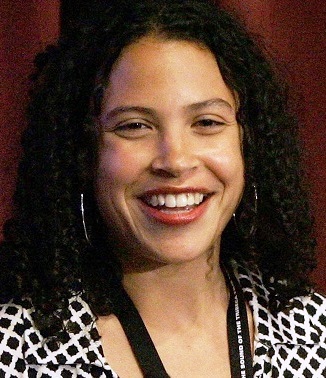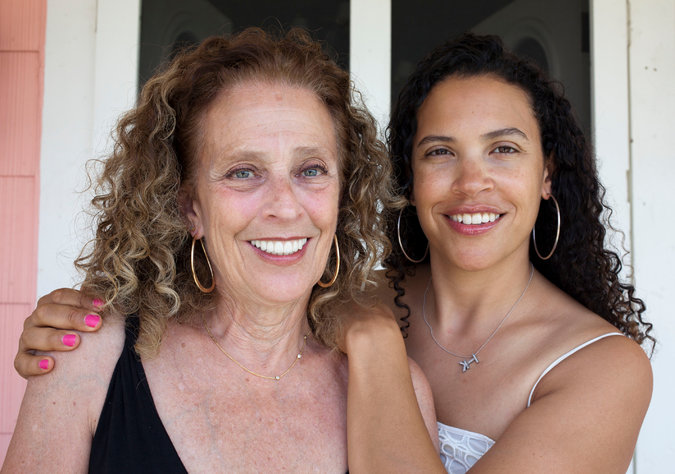
Throughout my life, people have asked me why I look the way I do. I would tell them that my parents were white, which was true to me. I wasn’t pretending to be something I wasn’t. I grew up being told, and believing, that I was white,
I had brown skin, curly hair and full lips. It was only when I was 18 that my mother admitted the truth: that she had had an affair with a friend and former colleague who was black. And that, in all likelihood, he was my biological father.
The revelation not only shook my relationship with my mother to the core, but also led me to question everything I had believed about who I was. Eventually it inspired me to make a documentary about the experience, called Little White Lie.
I started out wanting to make a film about being black and Jewish, because I was really struggling with my dual identity, But I was living in a racial closet at the time that was all about my family secret. So I decided to use the film as a way to fully uncover the secret.
Although I was an only child, I was close to my numerous aunts, uncles and cousins. I came from a long line of NY Jews, was the great-granddaughter of Eastern European immigrants, We went to the synagogue, bar mitzvahs, Hebrew school. My family knew who they were and they defined who I was.
Leafy, middle-class Woodstock was a liberal town but it was also very white.I have a vivid memory of being five and a little blond boy in her all-white kindergarten class asking me to show him the colour of my gums. It was the first time I remember feeling different, I already knew I didn’t look like the other kids at school but it was embarrassing to be singled out and it made me feel ugly.
I asked my parents why I looked different, and my father showed me a picture of his great-grandfather, a brooding, Moorish-looking Sicilian, and told me that I must take after him.
And that, I simply accepted this story. You know how things are within families, You know what you know and you reinforce that truth all the time. If you looked too closely at it, it didn’t make any sense. So we didn’t look at it.
But others sometimes took a peek. New friends would often ask if I was adopted, while established friends silently accepted the story they’d been told. One old friend admits she “knew Lacey looked black, but that she wasn’t”.
A family friend refers to the issue as “the 600lb gorilla in the room”, which would occasionally beat its chest. At age 11 I wrote in my diary that I wished she had lighter skin and that I hated my curly hair.
When I was 13, a member of the synagogue told me that it was “so nice to have an Ethiopian Jew in our presence”. And at high school the black kids would stare at me and ask, 'What are you?’ I’d tell them I was white. But I was in denial too; I had my blinkers on.
In my mid-teens my parents marriage began to unravel. Their divorce was really hard and completely shook my world. I believed that my mother’s affair was a factor in the break-up. Then discovered while making the film that it was something my parents had ever openly discussed. My father, I later found out, suspected that something had happened but had only said so once – he preferred to keep his blinkers on, too.
The first year of college I immersed myself in the university’s black community. I was ready to try on a new identity, My black friends just saw me as another black person. And my dark skin that I had always worried about was light skin to them. For the first time in my life, I felt like I belonged. I just knew that being black was who I was.
I attended meetings of the Black Student Alliance and became conscious of race in a way I never had been before. University was a crash course in race for a white person. Most white people don’t go through life thinking about their whiteness but black people think about race all the time. I learnt so much, including the fact that my black friends felt they had to work so much harder to prove their success.
I began seeing a (white, female, non-Jewish) therapist who helped me work through how I might open a conversation with my parents. Cont'd at right...

So, when I went home for the summer I asked my mother outright, “Why do I look the way I look? Why has nobody ever talked to me about it? How come nobody saw I was different?”
My mother didn’t want to talk about it and tried to avoid the subject. But I pressed on until she eventually admitted the truth. She’d had an affair with a man who was a famed basketball scout in New York City – and who had sat at the Schwartz family’s dinner table many times. There was “a good chance” that he was my father.
I didn’t know what to think, There was a large part of me that was relieved that I finally knew the truth. But my mom had been lying to me and to everyone else my entire life. I was so angry I could barely speak to her.
When I moved to New York at the age of 23 to pursue my dream of working in film, I also decided it was time to get to know my biological father.
According to my Mother, Peggy, he had suggested many times that I was his child but she had insisted to him that the man who had raised me was my father – not just biologically. That he was the one who raised me, who took her to school each day.
My real father was happy to get to know me better too, but I had to admit, with clear-eyed honesty, I didn’t feel a connection. For me, the simple fact of biology just didn’t create a bond,
Shortly before my 30th birthday he died. At his funeral I was seated on the front row and was announced during the service as one of his children. I found this odd and uncomfortable. For some people, that biological link is a huge thing, It’s similar with adoption; some people feel very connected to their birth family. Others don’t.
Today my relationship with the man who raised me is “solid”. When I got married in 2011 both my parents walked me down the aisle. My mother, to whom I am close to once more, regularly looks after my twins. Their birth also brought home to me the importance of having unearthed the secret that had festered for decades.
Now that the film is done, my mother loves it and feels it has helped her to stop lying and really learn how to live an honest life.
Myself, I believe that racial identity is both “fluid and contextual”. I think it can change depending on where you are and who you’re around,
The film shows myself and two black female friends discussing the “one drop rule”: the idea that if a person has even the smallest amount of black heritage, they are black. Being bi-racial, mixed race, is a category of being black, not a category of being white, It’s an inclusive thing. Something far more people than you know will experience today due to all the ways of accessing one's heritage via DNA.
